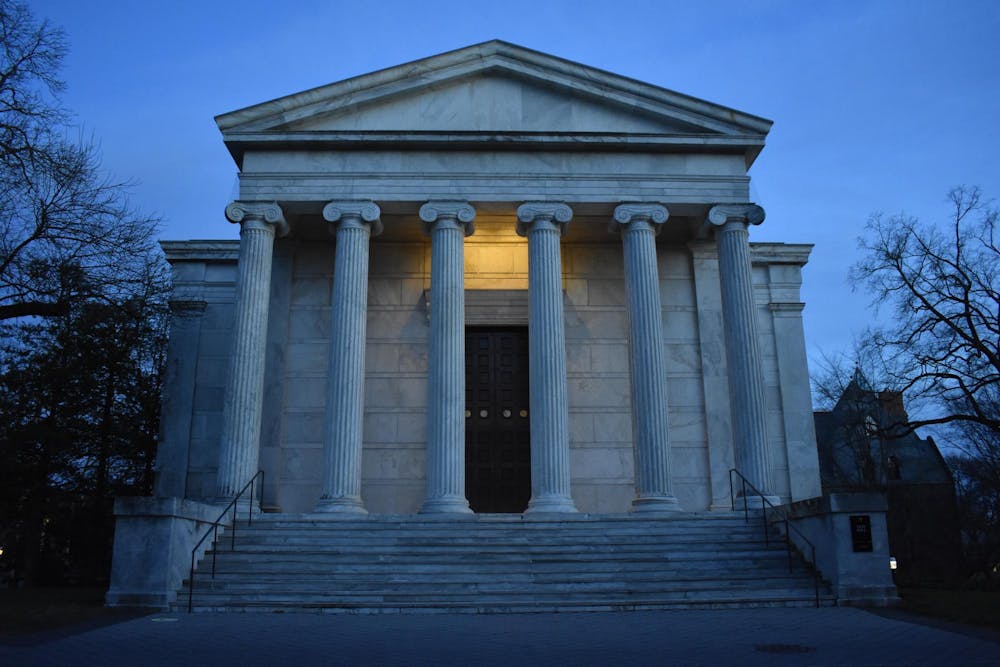Following the Clio Hall sit-in that ended in 13 student arrests, University President Christopher Eisgruber ’83 sent a campus-wide email stating that the University was “exploring offering students arrested for protest-related offenses the option to participate in a ‘restorative justice’ process.”
However, according to an email chain obtained by The Daily Princetonian, this process quickly collapsed.
A string of interactions between University administrators, deans of the Office of Religious Life (ORL), and the 13 students involved in the Clio Hall sit-in last spring, reviewed by the ‘Prince,’ show that efforts to set up a process abruptly ended after one of the students questioned what “restorative justice” looked like.
Their conversation was conducted via email in a chain initiated by Executive Vice President of the University Katie Callow-Wright, who connected the ORL deans — Allison Boden, Theresa Thames, and Matthew Weiner — with the students who were arrested during the Clio Hall sit-in.
After just four emails, Boden ended the process, writing, “There has been significant harm experienced by many Clio staff because of the action of the occupiers of Clio, even if that wasn’t your intention.”
“It’s clear from your response to my invitation, though, that this is not the moment for dialogue between you,” she said.
Callow-Wright, Thames, and Weiner declined to comment.
“When it became clear the arrested protest[e]rs were disinclined to proceed with a restorative justice process along these lines, it was not further pursued,” University Spokesperson Jennifer Morrill wrote in an email to the ‘Prince.’

According to Eisgruber’s May 13 email, arrested students would have to “accept responsibility for violating University policy, promise to avoid future violations, and reconcile with people significantly affected by their actions.” In exchange, the University would work to minimize the impact of the arrest on the students and quickly conclude the disciplinary process.
Boden, who has since retired, explained in her first email to the chain that faculty recommended the ORL deans facilitate the process, which Boden described as “a conversation between you and the staff of Clio Hall.”
“We ORL deans have just gotten off a zoom call with 8 members of the Clio staff, which is roughly 25 percent of the staff affected by the occupation of Clio,” she wrote. “Every attendee will have a chance to talk about their experience of the occupation and to be listened to, a fully confidential interaction whose goals are sharing, understanding (but not necessarily agreement), repair of any fractures if possible, and living well together at Princeton.”
“There are no disciplinary implications involved in this conversation; participation is entirely voluntary and attendance won’t be recorded,” she added.

Ariel Munczek Edelman GS spoke on behalf of the 13 arrestees, highlighting their concerns with Boden’s proposal.
“These boil down to two central questions: Restorative for whom? Justice for whom?” Edelman wrote in the email.
“The proposed meeting centers the administration’s incorrect narrative about the Clio Hall sit-in while neglecting the totality of how and by whom actual harms have been inflicted,” Edelman explained.
“President Eisgruber and Vice President Calhoun sent messages to the entire [U]niversity that lied about what happened in Clio Hall and slanderously portrayed us as violent. These actions were also harmful,” they continued. “Will this restorative justice process address the harms that the [U]niversity administration has inflicted on us?”
“I honestly think that we were skeptical when we first saw this [email],” another one of the thirteen arrested students told the ‘Prince’ in an interview citing the University’s portrayal of what occurred at Clio. The ‘Prince’ granted the student anonymity due to fear of retribution.
“The University had already punished us by banning us from campus and evicting us with no charge of violating any particular University policy based on what was a false story about what happened,” they said.
Edelman also addressed concerns regarding what they perceived as misrepresentation of protests, writing, “We are confused as to why 8 or more Clio Hall staff would participate when we interacted with just 3.”
“We certainly would be willing to have discussions about the direct effects of our actions but we are not responsible for Public Safety’s ‘shelter in place’ order issuance nor for the actions of any other students, staff, or community members,” they added.
“We are concerned that this is ‘restorative justice’ in name only,” they concluded. After this exchange, plans for a restorative justice process ended and have not restarted since.
The 13 arrested students are still waiting for a trial date after the judge again rejected a plea deal at the third pre-trial hearing on Nov. 5.
Although the restorative justice process did not occur, Morrill wrote that “the University did rapidly conclude the University disciplinary process and did make it possible for impacted students to participate in Commencement ceremonies and receive their degrees.”
Morrill continued, “While deferring to the prosecutor and court’s authority, the University has also expressed to the prosecutor its support for an outcome that minimizes the impact of the arrests on our students, while maintaining student accountability.”
Cynthia Torres is a News contributor for the ‘Prince.’ She is from New Bedford, Mass.
Associate News Editor Olivia Sanchez contributed reporting.
Please send any corrections to corrections[at]dailyprincetonian.com.








